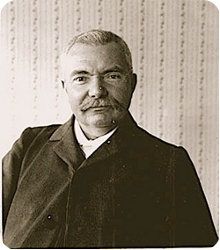A Quote by Charles Wagner
A man is simple when his chief care is the wish to be what he ought to be, that is honestly and naturally human.
Related Quotes
Each man's private conscience ought to be a nice little self-registering thermometer: he ought to carry his moral code incorruptibly and explicitly within himself, and not care what the world thinks. The mass of human beings, however, are not made that way; and many people have been saved from crime or sin by the simple dislike of doing things they would not like to confess.
Once in his life, a man ought to concentrate his mind upon the remembered earth, I believe. He ought to give himself up to a particular landscape in his experience, to look at it from as many angles as he can, to wonder about it, to dwell upon it. He ought to imagine that he touches it with his hands at every season and listens to the sounds that are made upon it. He ought to imagine the creatures there and all the faintest motions of the wind. He ought to recollect the glare of noon and all the colors of the dawn and dusk.
MAN, n. An animal so lost in rapturous contemplation of what he thinks he is as to overlook what he indubitably ought to be. His chief occupation is extermination of other animals and his own species, which, however, multiplies with such insistent rapidity as to infest the whole habitable earth and Canada.
Therefore the good man ought to be a lover of self, since he will then both benefit himself by acting nobly and aid his fellows; but the bad man ought not to be a lover of self, since he will follow his base passions, and so injure both himself and his neighbors. With the bad man therefore, what he does is not in accord with what he ought to do, but the good man does what he ought, since intelligence always chooses for itself that which is best, and the good man obeys his intelligence.
The man whose whole life is spent in performing a few simple operations, of which the effects are perhaps always the same, or very nearly the same, has no occasion to exert his understanding or to exercise his invention in finding out expedients for removing difficulties which never occur. He naturally loses, therefore, the habit of such exertion, and generally becomes as stupid and ignorant as it is possible for a human creature to become.
P. G. Wodehouse... used, when in town, to solve the problem of the long walk to the post-office by the simple expedient of tossing his letters out of his window: his belief that the average human, finding a stamped and addressed envelope on the pavement, would naturally pop it into the nearest pillar-box was never once, in decades, shown to be unfounded.
Before modern man can gain control over the forces that now threaten his very existence, he must resume possession of himself. This sets the chief mission for the city of the future: that of creating a visible regional and civic structure, designed to make man at home with his deeper self and his larger world, attached to images of human nature and love.
When we want a cup of tea our main wish is to drink tea, but to fulfill this wish we naturally develop the secondary wish to find a cup. In a similar way, the main wish of those who have great compassion is to protect all living beings from their suffering, but to fulfill this wish they know they must first attain Buddhahood themselves and so they naturally develop the secondary wish to attain enlightenment.































